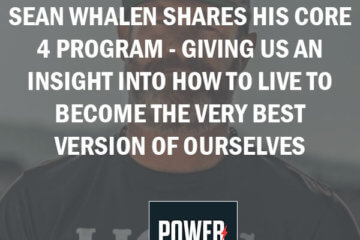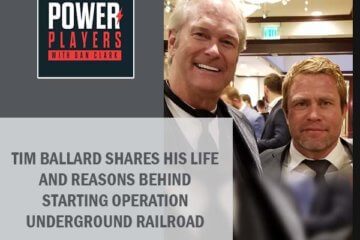Listen to the podcast here:
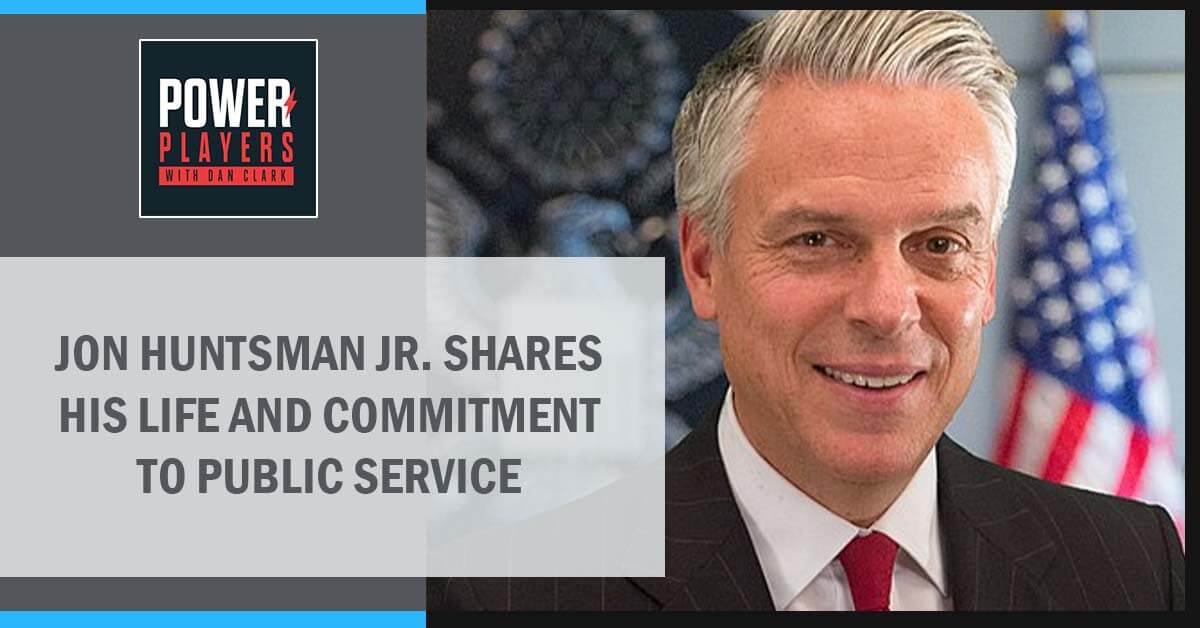
Leadership comes from experience with adversity, understanding failure, and how to bounce back. Face your fears and stay firm on your commitment to public service. In this episode, Jon Huntsman Jr. shares his life and commitment to public service as a Utah Governor and United States Ambassador to Russia and China. Join in the conversation to get an inside glimpse of how the world of diplomacy affects our ongoing Cold Wars. Plus, discover what we as citizens need to know about the global political scene! Don’t miss this episode!
—
Jon Huntsman Jr. Shares His Life And Commitment To Public Service
In this episode, Jon Huntsman Jr. shares his life and commitment to public service as a Utah Governor and as our United States Ambassador to Russia and China, giving us an inside glimpse of how the world of diplomacy affects our ongoing Cold Wars and what we as United States citizens need to know about the global political scene.
—
Please welcome my friend and hero legitimately, Jon Huntsman Jr. Thanks for joining me.
You make somebody sound like a winner with that wind-up introduction. I hardly deserve that.
Let’s talk about something intriguing. It’s the three P’s: Passion, Preparation and Pursuit. I don’t know anyone else on the planet who is a better spokesperson through your life in identifying and triggering passion, preparation and pursuing that passion than anyone else other than Jon Huntsman Jr. Let’s get right to a key question. You have been an ambassador three times. You have been a governor. You have been a CEO of a major kajillion-dollar corporation. What qualities, character traits, and leadership governing principles do you believe have been common in each one of your amazing leadership roles?
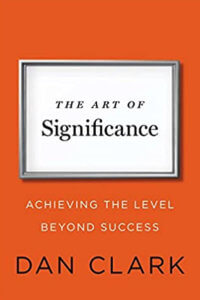
The Art of Significance: Achieving the Level Beyond Success
I’m no different than a whole lot of other people, whether you’re managing or responsible for big, high-profile organizations, a teacher in the classroom, or a law enforcement officer on patrol. Whatever you might be, you have a responsibility to define the parameters of leadership in your own unique world.
First of all, I have had the good fortune of looking to others around me over my lifetime to identify leaders and their style and approach to doing things. Whether it has been Jack Welch from General Electric, who I got to know many years ago and have spoken with him on a couple of panels during his lifetime. He passed away. Whether it was Alan Mulally, the CEO of Ford Motor Company, who brought me onto the Board of Directors of Ford for many years, I learned from him around the boardroom table. Whether it was George Shultz, Secretary of State under Ronald Reagan, who was probably one of the greatest secretaries of state we have ever had.
General Joe Dunford, who was the Chairman of the Joint Chiefs of Staff, who I worked with while in Russia. Whether it’s world leaders like Narendra Modi in India, who was a friend, or Lee Kuan Yew, who founded Singapore. Amy Gutmann, who is one of the great leaders in higher education. All of these people and so many more have all exemplified leadership. I have had the good fortune of watching and learning from them.
Some of what you learn about leadership is innate to who you are. Some of it is acquired through your experiences in life and observing others. Through it all, what I have come to find more than anything else, leadership in its rawest form is the ability to influence others because if you can’t influence others through how you live your life or how you run an organization, you fail fundamentally as a leader.
Leadership also, in terms of your ability to influence others, comes from experience with adversity because of understanding failure and how to bounce back. Leaders aren’t made during the good times or when things are rolling only in their favor. Leaders are made when the chips are down and when you have to roll up your sleeves, motivate an organization and pull yourselves up by the bootstraps.
I was thinking of running the embassy in Moscow, which is one of the most sensitive and high-profile embassies anywhere in the world based on what goes on there operationally. You lead a team of highly educated, trained, motivated professionals. They are military, intelligence and foreign service. They represent a couple of dozen US government agencies right across the board.
We were faced with the most extreme number of expulsions by the Russian government during the two years that I was there. They were kicking our people out right and left. They cut our embassy significantly. They closed down our consulate in Saint Petersburg. Try running a very sensitive national security operation, in a sense behind enemy lines, because that’s where you’re working in Moscow. I’m trying to do all the work and do what needs to be done based on the interest of the United States.
Leadership comes from experience with adversity, understanding failure, and how to bounce back.
You have your key offices gutted by 70%, yet you still have to keep doing the same work. You have your family separated and divided. You have people who are given hours notice before they are kicked out of the country. This is where people begin to work at their best, and it’s where leadership is defined. It’s where you as a leader come to grips with what you have within you to lead. It’s a combination of having a vision of where you want that organization to go.
What is the pathway ahead? A leader has got to see around the bend. You have got to know at that moment where you want to be and where is the promised land. Unless you can lead out any team based on empowerment, passion and elements of simplicity, people don’t understand what it is you’re saying, though, but is going to be able to follow. Whether it is leadership based on humility, openness or indeed a whole lot of love, people can feel in your heart if you’re sincere or not when you’re trying to lead them. All of that matters when you’re trying to lead an organization.
Throughout my life in running different organizations and trying to manage people, whether in government service, not-for-profit enterprises or for-profit enterprises, it comes down to the same basic principles of leadership. It isn’t that complicated. Unless you can influence others through your actions, you’re not going to lead people anywhere. You’ve got to back up and say, “How is it that I influence? How do you influence based on love, passion, simplicity and empowerment wrapped in a vision?”
Those are the five governing principles that have made you stand out in every crowd. You have selected service before self apparently as your bottom-line governing motivator. When did you first identify your leadership style as service above and before self?

Public Service: Adversity is always knocking on your door.
It goes all the way back to my family and relatives. I come from a long line of Naval officers. Whether it was my dad, his brothers, both my grandfathers or my uncles, they all served in World War II and beyond. Growing up, it didn’t matter whether we were visiting relatives in the Bay Area of California or in Fillmore, Utah, which is the home seat for the Huntsman family traditionally.
When people would get together and talk about what mattered most in life, it was never about wanting to make a lot of money because nobody had any money back in those days. There was no Huntsman Corporation and Huntsman Cancer Foundation. It was a bunch of stragglers with the last name Huntsman. The thing that mattered most to these good men, and they were mostly men because they were the only ones who served in that kind of capacity back in those days, was what they had done for their country and other people. Nothing else mattered.
When we had spare moments in front of the fireplace in my grandfather Huntsman’s simple little home, that’s what he would reflect on and talk about. I would look at the simple tokens of his life that he had in his living room. They were all representative of service. He was a school teacher himself. He was an educator. For him, that was the most important thing anybody could do for other people. In his life, it was that service to the country.
It didn’t quite resonate at 7, 8 or 10 years old as it did later on but the seeds were planted. Those stories were told about what mattered most. My uncles were getting a battlefield promotion and doing this or that. They helped serve the country. They were the lessons of life that for me always caused me to focus most on, “What can you do to help give something back, in this case, to your country or your community?”
Dan, you’re a great example of this too and you have been around other great examples. People are raised with different experiences and priorities. In many senses, it’s all about service. Those seeds are planted early on and people’s lives are shaped forever based upon those simple, early lessons. It probably goes back to those early examples in my family.
My last book published by Penguin was The Art of Significance. On the back cover, I had an amazing little recommendation blurb written by your sweet father, who was a hero to so many and the legacy he has left behind. I still remember the interview that he granted me, saying exactly what you have said. You’re echoing your father and his influence on our community and the entire world.
There’s a great song. It was written by me. It’s called Special Man. The lyrical hook is, “Any male can be a father but it takes a special man to be a dad.” I would reminisce if you didn’t have a chance to brag on your children for a moment because, in a fluent family, we have tendencies across the globe in every single culture to have a sense of entitlement to feel like, “This is good. I’m going to take the easy road.”
In the Huntsman clan, that is nowhere to be found, especially in your family because I intimately know your children. Could you share how this service-before-self attitude and commitment to our country and communities have taken hold in your own children? Wave your flag. Let’s start with your two sons. Please tell the world a little teeny bit about what they are up to and how proud we all need to be of them.
Unless you can influence others through your actions, you’ll not lead people anywhere.
It’s hard for dads to talk about kids. You love all kids. You hope and wish the best for them. In our own lives, we have been bound by the whole notion of service to the community and country. That is the greatest aspiration one can have and it isn’t about material positions. Life is not for slacking. Life is not a dress rehearsal. It is the real thing. Every day and moment count. What you choose to do in life is an important selection because that will determine how you then are able to give back, the skills that you derive from education or life’s experiences, and the people and networks you come in contact with who will further influence you.
Gladly, our kids have been influenced not by a questionable dad like me but by a lot of people who have been in our immediate universe. Since our life has been about service, they have been influenced by law enforcement, teachers, the military and people who are out serving communities. In our positions, you can’t for example be governor of a state. I found that kids who grew up in a governor’s mansion generally do want two things. One, they rebel and do the opposite. Two, they take in a lot of what is around you.
What is around you are people who are always serving and doing things for their community. All of our kids were influenced by people who were not big names in the community and not making big salaries but who were doing some of the most important work for their fellow citizens. That probably had some rub-off effect on them.
Naval officers and service television personalities anywhere will they take their platform and influence to exponentially multiply their ability to serve others. That’s your legacy. The legacy of Jon Huntsman Jr. is the ripple effect that you have created that will far outlast your life and election service. I can’t say enough about that. Let’s get to the second for you, Jon. Who inspired you to prepare? What did you specifically do?
You brought up the nightmare and the daily challenge of running the embassy in Russia. Will you please give us an inside scoop on the Chinese embassy when you were an ambassador to China? Maybe it’s a comparison or contrast of both of those experiences because they had to be similar, but they had to be drastically different. Share a story that talks about what prepared you for those leadership responsibilities.
It’s hard to know what in your life is going to prepare you most for any one event. It’s everything from being raised in a great family, being a boy scout, running for the class office, failing, playing in a band and working hard as a dishwasher as a kid because the work ethic was always stressed by my dad. Well before sixteen, it was work and work. It’s a combination of a whole lot of things that put you in the driver’s seat, maybe before you know it.
Leaders then rise or fall based upon what they have been exposed to up to that moment. When a leader rises, it’s a combination of the external experiences that they have dragged through life that gives them the skills. Let’s call it the street-smarts, where they can deal with a certain set of conditions. That’s probably combined with whatever good innate talents you might have brought along.
In the Huntsman line, we have got a lot of crazy genes. One of my relatives said early on, “Huntsmans either wind up in prison or they wind up doing interesting things.” There may be some truth to that. I have found watching my own dad as he was building a corporation that sometimes did well and sometimes hit the wall and came very close to failure.
The lessons of life for me in learning about leadership or around a family table, a small business that ultimately became a big business where we were all pulling in the same direction, where we didn’t sometimes know where the next line of credit was going to come from or we didn’t know if the next recession was going to completely collapse our business. You had to rely on customer relations and hope that they would extend their contracts on raw materials or a certain product in order for you to stay in business.
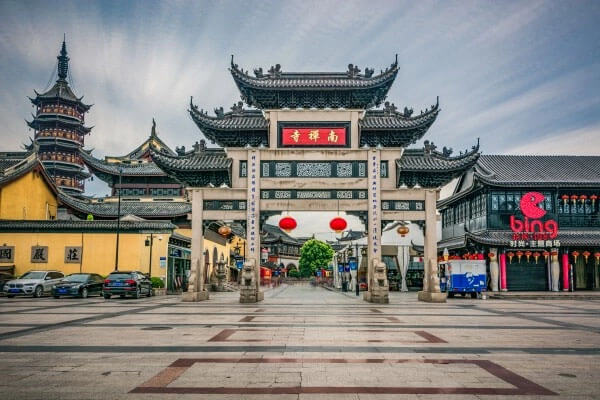
Public Service: Every day was a challenge in China because you were dealing with what is more or less an adversarial kind of relationship.
Adversity is always knocking on your door. That resulted in all of us who were part of that experience, a couple of my brothers and I, in a great word called resilience. As my dad always used to say, “No really means yes if you’re an optimist because everyone in life is going to tell you no.” When you’re starting a business, every banker is going to say, “Are you kidding me? That’s the worst business idea ever. We’re not going to finance you.”
When you get the business started, your customers are going to say, “No, I have been doing business with a name brand for too long. I’m not going to go with some startup company.” We were all trained early on that no really meant yes. That adversity sometimes brings out the best in the human condition and the human spirit.
In a sense, I was raised in conditions that from the outside might have always looked copacetic and bright. There’s never a dull moment but they were not around in the early days when things were getting off the ground and when we encountered some enormously difficult challenges and pushback. It was a lot of debt, leverage and moments where we were pretty sure that we were going to hit the wall and we had zero left.
That makes for a person who sometimes yearns for difficult moments, adversity and difficult conditions externally because that’s when things become interesting. That’s when the tough people get going. I remember in our own businesses when the times were good. My old band would say, “Business is so boring. I wish those bad days were on us again because that’s when your heartbeat gets going. Your imagination gets ticking and all the great ideas start flowing.” Those are the conditions that shaped me.
When a president asks you to go to a place like China, everyone says, “Are you kidding? That’s the craziest thing in the world. Why would you do that? That’s a surefire disaster.” That’s when you reflect on those old examples and you say, “No, you do it because it’s hard. You do it because this is what the human condition was built for. This is what your experiences in life are all about.” Later on, when the president asked if I would go to Russia, everyone around me said, “Are you kidding? In today’s world, going to Russia, not only is it dangerous but it’s a political dead end. You’re going to get clobbered.”
It was that sense of resilience inside. The best days are when it’s cloudy outside. I told the president, “If it’s important to you and to the country, we will go serve in the most difficult and awful diplomatic post in the world in today’s environment.” We did and they were the best couple of years we have ever experienced. In China, they were some of the best years as well, not because it was easy but because it was some of the toughest work we have ever done.
You brought up something critically important, and I want to share it with my readers. The statistics show that 85% of family-owned businesses are bankrupt and non-existent by the third generation. The reason why is because they do not subscribe to the original core values that the grandfather, great-grandfather or father subscribed to that built the business, sacrifice, work ethic, heart and service before self.
In the Huntsman clan, you have proven that statistic completely wrong. You have maintained that amazing menu of these core values. I wanted to point that out to the readers that that’s why I believe that you were called by a president, not of your specific registered political party, to go serve our country and represent every American in China. Was there one specific situation that you can recall off the top of your head in China that tested you to the core values on which you were raised?
Keep doing what you should do to help and serve.
Every day was a challenge in China because you were dealing with what is more or less an adversarial kind of relationship. In the outside world, particularly if you’re in the business community, the relationship with China is friendly. We engage and work together. In a perfect set of circumstances, that’s exactly what it should be. In a government context and a country-to-country context at the official level, it’s a very competitive relationship, which is to say that we spy on them and they spy on us. We run reconnaissance missions against them and they do it against us, and we are aggressive.
Most people never see this. When you’re there running the United States embassy, you’re in the captain seat. You get a daily view of what all of this means and how good it can be in terms of what we learned, but how dangerous it can be because they can throw you into a topspin pretty quickly when things go out of whack. You remember that from the EP-3 spy plane that went down in Hainan Island. It was in 2001 because one of our reconnaissance planes was clipped by a Chinese F-10 jet.
The jet went down into the ocean and killed the pilot. Miraculously, our Naval reconnaissance plane was able to make an emergency landing in China, where they held the crew for 2 or 3 weeks and discovered a treasure trove of codes and intelligence notebooks that were not destroyed on the plane. This kind of thing goes on on a regular basis, and most of it never is seen by the public at large. We went through some episodes that were pretty harrowing in our own right. Some maybe are to be written about in the years to come when I can do that.
There were some tough moments where they absolutely locked out our diplomatic interaction. They freeze the US Ambassador in place when we do something not to their liking, when we sell arms to Taiwan, for example. When our president meets with the Dalai Lama and when we sail our Naval ships into sensitive areas in the South China Sea, everything is taken out on the United States Ambassador.
You will get a call sometimes from the foreign ministry at 2:00 in the morning, demanding that you appear at the foreign ministry for a dress down. That’s a way to publicly humiliate you and try to embarrass you. It’s the typical way that they show their superiority in certain instances. They will freeze you out. You will be locked out of any meetings. You will be frozen from travel. You will be unable to interact with any Chinese official. This can go on interminably based upon our bad behavior. As the Chinese see it, we’re always engaging in bad behavior and stuff they don’t like.
The US mission in China is probably among the biggest in the world. We have a couple of thousand people who were part of the US embassy staff in five different consulates around that mammoth country. They are doing every aspect of work you can think of. The managerial responsibility all by itself is enormous because it’s like a large corporation that you’re running. Every day, you’re plowing through a range of issues from the traditional diplomatic intelligence security right on through to pandemic disease or Federal Aviation Administration or IRS-related issues. It’s a microcosm by the US government that we’re right.
I remember on one occasion right after the Arab Spring, where there was a real sensitivity about the United States engaging in the Jasmine Revolution, planting seeds in foreign countries that would topple governments that we didn’t like. I was caught up in one situation. You can go on the internet and take a look at it, where I wandered into a part of Beijing where it was thought that there were local Chinese who were protesting and beginning one such Jasmine uprising. I appeared in every newspaper on every newscast in China and well beyond. They banned my name from the internet in China because my Chinese name and my English name were synonymous with revolution.
It created major turmoil for me and for our United States embassy because they were convinced that we were spreading revolution and trying to topple the Chinese government as part of a broader plot. Things get intense. The work is enormously interesting and there’s never a dull moment. If you’re a baseball player, you want to play in Yankee Stadium. If you’re a diplomat or if you’re in the intelligence world, you want to work in the embassies in Moscow and Beijing because the work does not get any better.
That brings us to the final P of the three P’s that are required to become a power player. That is pursuit. You are relentless. I want to consolidate two questions into one to solicit your answer. I want to know why you remain motivated to keep serving. Haven’t you done enough? One of the coolest things that all of the readers need to understand is the power of your partnership with Mary Kaye, who we all adore and love. It’s almost like a joint calling because she is such a natural ambassador of all the five things you talked about, love, joy, integrity, service and all the other things we have talked about in this interview.
Jon, why don’t you take off your shafts? Why don’t you hang up your cleats? Why don’t you come back to Utah, chill out, maybe go snowboarding and hop on your motocross bike? All of a sudden, you rise again. You’re this phoenix saying, “We still have more to go.” You don’t want to die at the base of the mountain. You want to die while climbing. Part one of the question is, how do you stay motivated to pursue this passion of service before self and then tying it into the final question?
Professor Randy Pausch was famous for coining that phrase, The Last Lecture. He was battling cancer when he recorded this talk for his three girls so that they could watch it after he passed away. Here’s the premise. If you had one day to live, what is your consolidated message to the world that also explains why you keep on serving?

Public Service: Experience is the greatest teacher in life.
First of all, here’s an answer to your first question. Mary Kaye, my beloved wife, who you referenced very appropriately, would never let me off the hook if I hung up my cleats. She is the first one to say, “No, you’re not going to do that. You’re going to keep doing what you should do to help and serve.” Life is not a dress rehearsal. The passing of my dad, for me, was a reminder that life sometimes is shorter than expected that you have a situation where every day and every year counts. You’re not to waste any of it. That’s not to say you become compulsive to any strange degree but it means that in life, you have a choice.
Theodore Roosevelt talked about this. When my two sons went to the Naval Academy and when they were plebes, they were lower than dirt, as I call them in their plebe year or their very first year. One of the first things they had to do was to memorize Man in the Arena by Theodore Roosevelt and read it and reread it because it’s a great inspiration. It talks about those in the arena and the price one pays of being in the arena as compared to those cold timid souls on the outside, who know neither victory nor defeat because that’s not what makes life, leadership and communities go.
As my old man used to say, “We all get a tombstone at the end of life. It’s up to you to determine exactly the 1 or 2 words on that tombstone that will define you. They won’t define themselves and it’s not going to be a blank slate. You have to define those 2 or 3 words on your tombstone.” I certainly hope that at least among the 2 or 3 words for me, service will be one of them. That means you give it your all until your very last breath. That’s the way we were raised and the way that we view life, all of us in the Huntsman clan.
Johnny Carson, his tombstone says, “I’ll be right back.” It’s in the same flavor as yours.
In 2020, before we returned from Moscow, my dad had passed the year before. We have eight grandkids now. I have got two sons out, serving active duty military assignments. I got a cancer diagnosis. It’s stage one melanoma and it was perfectly treatable. The sad commentary on this one is sometimes we talk about mental health and the toll it’s taking on society.
The oncologist who diagnosed my melanoma and who cut a sizeable gash out of the side of my face and the back of my leg committed suicide. It’s one of these sad things where even those who are riding at the top of their game, inside the heart is sometimes hidden sorrow that the eye can’t see. It’s another reason that running for governor that mental health is one of my headline issues that we’re going to tackle to the best of our ability.
If you have one day to live, what are you going to teach your old buddy, Dan, and everybody else?
That is such a profoundly powerful setup and I’m so inadequate in my ability to be able to deliver on it. I would probably have to say something like the old Julius Caesar phrase, “The greatest teacher in life is experience.” That’s what we all want to gather because experience is what you get when you don’t get what you want. Experience never comes out unless we get out of bed, put on our shoes and try, but many never try. This is the last lecture thing. Why don’t people try? It’s because they fear failure. They fear that they might lose, be embarrassed, humiliated or go bankrupt.
The bottom line is, imagine what we might accomplish all of us if we took the fear out of our minds and decision-making processing. Managing fear becomes central to anything that we achieve because fear is the only thing that stands in the way of ultimately or gaining experience, which is the greatest teacher in life. How many of us fail on the fear factor or the experience factor because we simply allow fear to stand in the way? If there’s one thing you want to leave folks reflecting on that might make their lives a little bit better, you exclude fear completely from your decision-making process.
Ladies and gentlemen, my guest has been Jon Huntsman Jr. He is one of the more prolific public servants in our generation, perhaps in the history of America, because of his service as ambassador in three different countries. He is the only ambassador who has been the ambassador of both China and Russia, serving under five administrations. As you promised, you are so far from retirement, and we love you for that. Remember, when you finally decide to be a power player, your power play begins in you so eloquently explained by Jon Huntsman Jr. Until next time, quantify your takeaway and go make a power play. Thanks, my dear friend. God bless you and your family. God bless America.
Thank you, Dan.
Important Links:
About Jon Huntsman Jr.
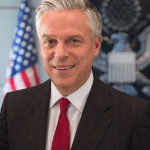 Jon Huntsman Jr. is an American businessman, diplomat and politician who served as the 16th Governor of Utah from 2005 to 2009. A member of the Republican Party, he served as the Ambassador of the United States to Russia from 2017 to 2019, to China from 2009 to 2011, and to Singapore from 1992 to 1993. Huntsman has served in every presidential administration since the presidency of Ronald Reagan, not counting the Biden Administration. He began his career as a White House staff assistant for Ronald Reagan, and was appointed Deputy Assistant Secretary of Commerce and U.S. Ambassador to Singapore by George H. W. Bush. Later as Deputy U.S. Trade Representative under George W. Bush, he launched global trade negotiations in Doha in 2001 and guided the accession of China into the World Trade Organization. He served as CEO of Huntsman Family Holdings, a private entity that held the stock the family owned in Huntsman Corporation. He has also served as a board member of Huntsman Corporation, and as chair of the Huntsman Cancer Foundation. Huntsman is the only American ambassador to have served in both Russia and China, having served as the U.S. Ambassador to China under Barack Obama from 2009 to 2011 and as the U.S. Ambassador to Russia under Donald Trump from 2017 to 2019. While governor of Utah, Huntsman was named chair of the Western Governors Association and joined the Executive Committee of the National Governors Association. Under his leadership, Utah was named the best-managed state in America by the Pew Center on the States. During his tenure, Huntsman was one of the most popular governors in the country, and won reelection in a landslide in 2008, winning every single county. He left office with approval ratings over 80 percent and was succeeded by Lieutenant Governor Gary Herbert. He was an unsuccessful candidate for the 2012 Republican presidential nomination. He ran for governor again in 2020, but narrowly lost in the Republican primary to Lieutenant Governor Spencer Cox.
Jon Huntsman Jr. is an American businessman, diplomat and politician who served as the 16th Governor of Utah from 2005 to 2009. A member of the Republican Party, he served as the Ambassador of the United States to Russia from 2017 to 2019, to China from 2009 to 2011, and to Singapore from 1992 to 1993. Huntsman has served in every presidential administration since the presidency of Ronald Reagan, not counting the Biden Administration. He began his career as a White House staff assistant for Ronald Reagan, and was appointed Deputy Assistant Secretary of Commerce and U.S. Ambassador to Singapore by George H. W. Bush. Later as Deputy U.S. Trade Representative under George W. Bush, he launched global trade negotiations in Doha in 2001 and guided the accession of China into the World Trade Organization. He served as CEO of Huntsman Family Holdings, a private entity that held the stock the family owned in Huntsman Corporation. He has also served as a board member of Huntsman Corporation, and as chair of the Huntsman Cancer Foundation. Huntsman is the only American ambassador to have served in both Russia and China, having served as the U.S. Ambassador to China under Barack Obama from 2009 to 2011 and as the U.S. Ambassador to Russia under Donald Trump from 2017 to 2019. While governor of Utah, Huntsman was named chair of the Western Governors Association and joined the Executive Committee of the National Governors Association. Under his leadership, Utah was named the best-managed state in America by the Pew Center on the States. During his tenure, Huntsman was one of the most popular governors in the country, and won reelection in a landslide in 2008, winning every single county. He left office with approval ratings over 80 percent and was succeeded by Lieutenant Governor Gary Herbert. He was an unsuccessful candidate for the 2012 Republican presidential nomination. He ran for governor again in 2020, but narrowly lost in the Republican primary to Lieutenant Governor Spencer Cox.
